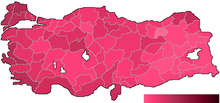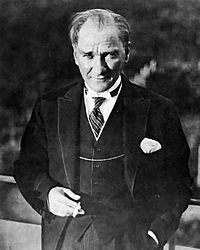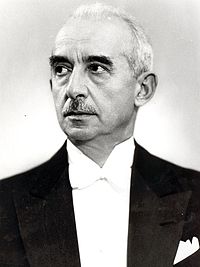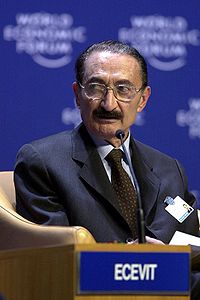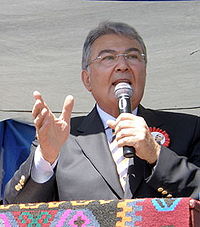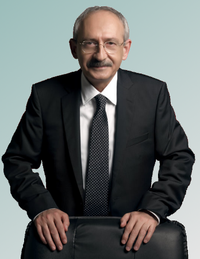- Republican People's Party (Turkey)
-
Republican People's Party
Cumhuriyet Halk Partisi
Leader Kemal Kılıçdaroğlu Secretary-General Bihlun Tamaylıgil Founder and "Eternal Chief" Mustafa Kemal Atatürk Slogan CHP varsa herkes için var. Founded September 7, 1919 (as a resistance organisation)
September 9, 1923 (as a political party)
September 9, 1992 (reestablishing)Preceded by Association for the Defense of the Rights of Anatolia and Rumelia Headquarters Anadolu Bulvarı 12, Söğütözü, Ankara Youth wing CHP Youth Movement Ideology Kemalism,[1]
Social democracy[1]Political position Centre-left International affiliation Socialist International European affiliation Party of European Socialists (Associate member) Official colours Red and White Seats in the Grand National Assembly: 135 / 550Seats in the Municipalities: 499 / 2,919Website http://www.chp.org.tr/ Party flag 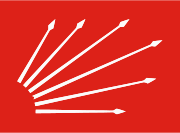
Six Arrows (Altı Ok)Politics of Turkey
Political parties
ElectionsThe Republican People's Party (Turkish: Cumhuriyet Halk Partisi, CHP) is a centre-left Kemalist political party in Turkey. It is the oldest political party of Turkey and is currently Main Opposition in the Grand National Assembly. The Republican People's Party describes itself as "a modern social-democratic party, which is faithful to founding principles and values of the Republic [of Turkey]".[2] Also the party is cited as "the founding party of modern Turkey".[3]
The party was established during the Congress of Sivas as a union of resistance groups against the invasion of Anatolia. The union represented Turkish people as a unified front during the Turkish War of Independence. On September 9, 1923, "People's Party" officially declared itself as a political organization and on October 29, 1923, announced the establishment of the Turkish Republic. On November 10, 1924, the People's Party renamed itself to "Republican People's Party" (CHP) as Turkey was moving into a single-party period.
During the singleparty period, CHP became the major political organization of single-party state. However, CHP faced two opposition parties during this period. The first one was the Progressive Republican Party established in 1924 by some famous generals such as Kazım Karabekir and Ali Fuat Cebesoy of the Turkish War of Independence and the second one was the Liberal Republican Party founded by Ali Fethi Okyar in 1930, both of which, however, were banned within a few months of their establishment by the "single-party state". This experience was followed by the National Development Party founded by Nuri Demirağ, in 1945.
The current (or modern) structure of the party was established with the transition to multi-party period. After World War II, with the title Millî Şef ("National Chief"), Gen. İsmet İnönü, who was in lead of CHP, has introduced democratic elections to the Turkish society. Consequent reforms enabling further democratization can also be interpreted as a response to the Soviet threat since the Soviet Union was about to get permission from the former allies to invade the Eastern part of Turkey and to limit Turkish sovereignty over her straits. Due to widespread dissatisfaction with the CHP, the party lost the first truly-democratic elections (the second general elections after 1946) of the republican era, held in 1950, and he left his seat[citation needed] to his old companion, Celal Bayar.
During the interim "multi-party periods" in between the military coups of 1960, 1971, and 1980, CHP is regarded as being social-democratic (member of the Socialist International),[4] state nationalistic and secular/laicist. The party's logo consists of the Six Arrows, which represent the foundational principles of Kemalist Ideology: republicanism, nationalism, statism, populism, laïcité, and revolutionism.
CHP, along with all other political parties of the time, was closed down for a brief period by the military coup of 1980. An inheritor party which still participates in Turkish democratic life, was established in 1984, as Democratic Left Party by the former leader of CHP, Bülent Ecevit. CHP was finally reestablished with its original name on September 9, 1992, with the participation of a majority of its previous members of the pre-1980 period.
Contents
Current position
The Republican People's Party is currently a centre-leftist political party with traditional ties to the middle and upper-middle classes such as white-collar workers, retired generals, government bureaucrats, academics, college students, left-leaning intellectuals and labor unions such as DİSK, and well-to-do entrepreneurs. Nevertheless, the loose relationship between CHP and some labor unions, business chambers and most non-governmental organizations alienated many voters. The distance between the party administration and many leftist grassroots, especially left oriented Kurdish voters, contributed to the party's shift away from the political left towards authoritarianism.
Despite heavy criticism from liberal and libertarian socialist interest groups, CHP still holds a significant position in the Socialist International as well as being an associate member of the Party of European Socialists. CHP urged the Socialist International to accept Republican Turkish Party of the Turkish Republic of Northern Cyprus as an observer member.
At the 2007 general election CHP ran in alliance with Democratic Left Party. CHP suffered a heavy defeat, getting 7,300,234 votes (20.85% of the total). CHP, YTP, and DSP combined got 21.77% of the votes back in 2002. The party could become first only in three provinces in Thrace (Edirne, Tekirdağ, Kırklareli) and two provinces on the Aegean coast (İzmir, Muğla). With these results, 112 candidates (13 of these MPs are DSP affiliates) were elected to the Grand National Assembly of Turkey from the CHP electoral sheet compared to 178 in 2002.
CHP increased its vote share from 20.9% to 23.1% in the 2009 municipal elections. The party gained considerable ground by winning Antalya, Giresun, Zonguldak, Sinop, Tekirdag, Aydin despite losing Trabzon municipality. In 20 provinces of Turkey, the party received less than 3% of the votes.[5]
History
Atatürk period (1923-1938)
During the War of Independence, 1919–1922, the parliament in Ankara was composed by different types of deputies. To have a harmony among his followers, Mustafa Kemal and his colleagues formed Müdafaa-ı Hukuk grubu (the group of Defence of the Law). The opposition to Mustafa Kemal or to the commissars elected by the parliament has united under the name of second group of Defence of the Law, simply second group (so the Mustafa Kemal followers were later called as first group). Although second group has always been minority, it could create active opposition within the parliament. In January 1923, Mustafa Kemal Pasha announced that first group would be transformed to a Party named Halk Fırkası (People's Party). In May 1923, the parliament called a bill for new elections, most probably, because Mustafa Kemal and his colleagues wanted to guarantee the peace treaty's, held in Lausanne, approval by more unanimous parliament. The People's Party was officially founded only after the 1923 elections. The 1923 elections were definitely the victory of forthcoming Party, because of the its leaders reputation after the military victory of the War of Independence and it was the liquidation of second group. Thanks to this unanimity of this second parliament, the republic was proclaimed, the Treaty of Lausanne was accepted and Caliphate was abolished.
However, in 1924, after the short-period of a single-party rule, many of Mustafa Kemal's ex-colleagues, for many reasons (their growing loss of power, their opposition to the short-period of a single-party rule's revolutionary activities, etc.), including Rauf Orbay, Kâzım Karabekir, Ali Fuat Cebesoy and many others founded an opposition party called Terakkiperver Cumhuriyet Fırkası (Progressive Republicans Party). After the foundation of an opposition party, People's Party changed his name to "Republican People's Party". The life of Progressive Republicans Party was short. In 1925 Sheikh Said rebellion was sparked in the east of Turkey. The party was shut down because of martial law. Takrir-i Sukun and all other prominent members were sent before the Independence Courts, but none of them was found guilty and all of them were later released. From 1925 until 1946 there was single-party rule, with one interruption; Serbest Fırka (Liberal Party) which was actually founded by Atatürk himself, and its leader was one of his closest friends, Ali Fethi Okyar. This party was closed down by its founders shortly after the İzmir meeting, which was a huge demonstration against the Republican People's Party. In the period of 1925-1930, the Republican People's Party introduced measures transforming Turkey in to a modern State. In the period of 1930-1939, the Party transformed itself and tried to broaden its ideology (for instance, the '6 arrows' were adopted in 1930) after the Liberal Republican Party experience showed CHP leaders how fragile their rule was.
The day after Atatürk's death, İsmet İnönü was elected the second president and assumed the leadership of CHP. During the general nationwide congress of CHP on 26 December 1938, İsmet İnönü was elected as the "everlasting CHP leader". The delegates awarded Atatürk the title "eternal chief", and awarded İnönü the title "national chief".
During 1940s, CHP established Village Institutes, which were an enlightenment project developed in order to reduce the huge gap that existed between urban and rural areas. Various scientists, writers, teachers, and doctors graduated from Village Institutes; and supported Turkey's modernization efforts.
İnönü period, (1938–1972)
In the elections of 1946, which were done in a "unique" fashion, whereby the votes were cast out in the open (under the watchful eyes of the state/CHP apparatus) and then they were tallied in secret by the CHP faithfuls and then burned and destroyed immediately, CHP claimed that they won the elections by a 70% majority vote and gained 396 seats and thus self-ranked as the first party. However, to protect their seats before the 1946 elections, CHP had introduced and passed the electoral legislation bringing the winner-take-all system for each province. In this system, if a party got the most votes in a province, it would have captured all MP seats for that province. However, at the elections of 1950, Republican People's Party was hit by its own electoral system, DP gained 408 seats with 53.3% vote. This was followed by the defeat on 3 September 1950 municipal elections, in which Democratic Party (DP) gained 560 municipalities, and CHP only 40 municipalities.
Real multiparty democracy began with CHP transferring power to DP in a peaceful manner, without a revolution or a coup, in 1950. From that time on, the Republican People's Party formed the official opposition.
On 26 November 1951, during the ninth Congress of CHP, the youth branch and the women's branch of CHP were formed. On 22 June 1953, the establishment of labor unions and vocational chambers was proposed, and the right to strike for workers was added to the party program.
On 2 May 1954, CHP again lost the elections to DP, gaining only 31 seats with 35.4% of the total vote. DP captured 505 seats with 57.6% vote, due to the winner-take-all system. Following this defeat, CHP began intensifying its opposition tactics and increased its share of the votes to 41%, gaining 178 seats, in the 27 October 1957 elections. DP gained 424 seats with 47.9% vote.
In the military coup of 1960, National Unity Committee was formed by upper-class soldiers. The National Unity Committee closed the Democratic Party and started trials to punish Democratic Party leaders for their alleged dictatorial regime. As a result, on 16/17 September 1961, Prime Minister Adnan Menderes, Foreign Minister Fatin Rüştü Zorlu, and Finance Minister Hasan Polatkan were hanged in İmralı island prison. President Celal Bayar was forgiven due to his old age, but sentenced to life imprisonment.
In 1961, Justice Party (AP) was established, claiming to be the successor to the Democratic Party. In the meantime, the National Unity Committee established an interim House of Representatives instead of the TBMM, in order to prepare a new constitution for Turkey. In the new constitution, the Constitutional Court was to be established, to prevent the government from violating the constitution. The 1961 constitution is accepted to be the most liberal and democratic constitution in Turkish history. Also, the winner-take-all electoral system was immediately abolished, and proportional representation system was introduced. The new constitution brought Turkey a bicameral parliament, composed of the Senate of the Republic as the upper chamber, and National Assembly as the lower chamber. The National Unity Committee chairman General Cemal Gürsel was elected as the fourth president of Turkey.
On 15 October 1961, CHP won the elections, gaining 173 seats with the 36.7% of the vote. AP gained 158 seats, with 34.8% of the vote. CHP leader İsmet İnönü formed the coalition with the Justice Party (AP) and became prime minister. This was the first coalition government in Turkey's history. İnönü established two coalition governments until the 1965 elections.
Süleyman Demirel became prime minister in the late 1960s, and because he was the leader of the AP (Justice Party), he continued in the tradition of Adnan Menderes gaining a large amount of support from both the religious voters and democrats.
Ecevit period (1972–1980)
In 1971, the army brought down the AP government of Süleyman Demirel. The secretary general of CHP Bülent Ecevit protested military intervention and resigned from his post. He also criticized İnönü for not protesting the intervention. By his quick and energetic reactions, he gained support from the intellectuals and in 1972 , he succeeded İsmet İnönü as the leader of the party. Following some interim governments CHP won 1973 elections by % 33 and formed a coalition with National Salvation Party (MSP) of Necmettin Erbakan. Bülent Ecevit began to take on a distinct left wing role in politics and, although remaining staunchly nationalist, tried to implement socialism into the ideology of CHP. The support of party also increased after Turkish intervention to Cyprus following a coup which had been staged by the Cypriot National Guard led by Nikos Sampson.
CHP and MSP had however very diverged ideologies, especially on secularity and in 1975 a new coalition government led by Süleyman Demirel was formed by four parties. Nevertheless CHP was still the most popular party. CHP won 1977 elections by % 41 vote, which is a record in CHP history. But CHP couldn't gain the majority of seats and from 1977 to 1979, the CHP was the main party of two brief coalition governments. But in 1980, the AP returned with Demirel. The political switching between the CHP and the AP came to an end when the military performed a coup and banned all political parties.
Recovery period, 1980–1992
After the 1980 military coup, the name of "Republican People's Party" and the abbreviation CHP was banned from use by the military regime. Until 1998, Turkey was ruled by the center right Motherland Party (ANAP) and the True Path Party (DYP), unofficial successors of the Democrat Party.
CHP followers also tried to establish parties. But they were not allowed to use the name CHP and were not allowed to elect the well known names of pre 1980 politicians to party posts. So they had to introduce new politicians. The three parties of CHP followers were ; Halkçı Parti (Populist Party, HP) of Necdet Calp, Social Democracy Party (Turkish: Sosyal Demokrasi Partisi, SODEP) of Erdal İnönü and Demokratik Sol Parti (Democratic Left Party, DSP) of Rahşan Ecevit. But even these new names were chosen to remind people of CHP. Necdet Calp was İsmet İnönü’s secretary when İnönü was prime minister. Erdal İnönü (internationally known pyhsicist ) was İsmet İnönü’s son and Rahşan Ecevit was Bülent Ecevit’s wife. The ban on pre 1980 politicians was lifted in 1987 and on pre 1980 parties was lifted in 1992. Both of these normalization steps were largely due to Erdal İnönü’s efforts. He also tried to unify the three parties; but he was only partially successful. Although SODEP and HP were united in 1985 to form Sosyal Demokrat Halkçı Parti (Social Democratic Populist Party, SHP), DSP was not persuaded.
Baykal period (1992–2010)
CHP was reestablished after the 1987 referendum and a legislation in 1993 which allowed the reestablishment of older parties.
In 1991, since Turkey's election system had two large election thresholds (10% nationwide and 15% local thresholds) and since center-left is divided into two parties (SHP and DSP), social democrats and democratic left groups had little power in the parliament. Between 1991 and 1995, Turkey was ruled by the coalition of center-right DYP and center-left SHP (Social Democratic Populist Party) (later SHP joined CHP). The political coalitions which ruled Turkey from the center right ANAP and DYP were making the country increasingly unstable. The Islamists returned with a new party the Refah (which was also later banned) while MHP the far right nationalist party had begun to take advantage of the disillusionment felt by former supporters of the Refah Party and the ever bickering ANAP and DYP.
In 1995, the Islamic Welfare Party (Refah Partisi) step into Parliament, and the CHP seemed to have been deserted by the Turkish people, having only 10% nationwide support and only 49 deputies of 550. It now seemed as if the CHP had been replaced as the main left-wing party.
But the Welfare Party was banned in 1998, and during the 1990s the Democratic Left Party (DSP), led by former CHP leader Bülent Ecevit, gained popular support. (Democratic Left Party is established by Ecevit family in 1985.) In 1998, after the resignation of RP-DYP coalition following the "February 28" post-modern and soft military coup, center-right ANAP formed a coalition government with center-left DSP and the small center-right party DTP (Democratic Turkey Party), along with the support of CHP.
However, due to big scandals, corruption and some illegal actions of this coalition, CHP withdrew its support from the coalition and helped bring down the government with a "no confidence" vote. Just before the elections of 1999, DSP formed an interim minority government with the support of DYP and ANAP; and the PKK leader Abdullah Öcalan was captured in Kenya under the Ecevit rule.
Therefore in the elections of 1999, CHP failed to pass the 10% threshold (8.7% vote), winning no seats in Parliament. Baykal resigned in 1999, Altan Öymen became the leader. But 1 year later, Baykal became the leader of the party again.
About a month after the general elections of 1999, a coalition government between DSP-MHP and ANAP was formed under the leadership of DSP. This government passed many important laws, including banking reform, unemployment insurance, law to ensure the autonomy of the Central Bank, qualified industrial zones, tender law, employment incentive law, to name a few. The government also changed 34 articles of the Constitution to widen fundamental rights and freedoms, and did this with the approval of all the parties in Parliament. Turkey became a candidate country to the European Union (without any political preconditions and with equal treatment as all other candidate countries). Three major EU harmization packages were passed during this government, including the most comprehensive package of August 3, 2002, which included the removal of the death penalty and many changes in fundamental rights and freedoms. An economic crisis which resulted from long overdue problems from previous governments caused a drop in the currency in February 2001. But 2 months later, the government passed a series of very comprehensive economic reforms which enabled the high growth of 2002-2007.
Because DSP was staunchly opposed to the invasion of Iraq by the US, a campaign to divide the DSP and force a change of government in Turkey was started. When its coalition partner MHP called for early elections in the summer of 2002, ıt was forced to enter early elections, before the results of the wide economic reforms could be felt. As a result, none of the coalition parties were able to pass the 10% national threshold.
In the 2002 Parliamentary elections, the CHP won 178 seats in Parliament, and only it and the AK Party (Justice and Development Party) entered Parliament. The CHP became the main opposition party again and Turkey's second largest party. It had begun the long road to recovery.
It must be understood however, that this had very little to do with voters supporting CHP. Many were former DSP supporters who were angry at the economic crisis that many blamed on the Ecevit government. Also many DSP and ANAP supporters left these parties for AK Party as did many MHP and Fazilet (now Saadet party) members.
Many on the left are still very critical of the leadership of CHP especially Deniz Baykal, who they complain is stifling the party of young blood thus turning away the young who turn either to apathy or even to vote for AK Party. While AK Party boast of a young leadership who have lived through many of the difficulties of many in Turkey CHP are seen as an 'old guard' that do not represent modern Turkey. The leftists also are very critical of the party's continuous opposition to the removal of Article 301 of Turkish penal code; which caused people to be prosecuted for "insulting Turkishness" including Nobel Winner author Orhan Pamuk, Elif Şafak, and the conviction of Turkish-Armenian journalist Hrant Dink, its attitude towards the minorities in Turkey, as well as its Cyprus policy.
Despite this recovery, since the dramatic General Election of 2002, the CHP has been racked by internal power struggles, and has been outclassed by the AK Party government of Recep Tayyip Erdoğan. In the local elections of 2004, its overall share of the vote held, largely through mopping up anti-Erdoğan votes among former supporters of smaller left-wing and secular right-wing parties, but was badly beaten by the AK Party across the country, losing former strongholds such as Antalya.
Much of the blame was put on the leader of CHP Deniz Baykal. After the local elections CHP was racked by defections of several key members of the party all claiming a lack of democratic structure within the party and the increasingly authoritarian way in which Deniz Baykal runs the party. Even those who support Deniz Baykal would admit that the party would be much more successful with a different leader.
In October 2004, New Turkey Party (Yeni Türkiye Partisi, YTP) merged into the CHP. Lately Baykal is bidding for fusing the DSP and CHP together under one roof, namely CHP, under his leadership.
In order to present a strong alternative to the AK Party in the 2007 national elections, the DSP showed a sacrifice and entered the elections together with the CHP. The CHP and DSP alliance received %20.9 of the votes and entered the Parliament with 112 Members of Parliament.
During the 2009 local elections, the party tried to attract the conservative and devout Muslims to the party by allowing women who wear the chador to become party members including promises to introduce Koran courses if requested in every district.[6] However, the allowing of women wearing hijab into the party was received with a severe blow when a normally non-headscarved member of CHP (Kıymet Özgür) committed a provocation by wearing a black hijab and trying to get into an election bus in Istanbul. The incident raised questions about CHP's initiatives in favor of religious freedoms.[7] The new initiatives introduced were surprising inside and outside the party, including military leaders, which the party itself is a major defender of Kemalist principles.
On May 10, 2010, Deniz Baykal announced his resignation as leader of the Republican People's Party after a clandestinely made video tape of him, sitting on a bed where a woman is also eminent, who is identified as Nesrin Baytok, his former private secretary and a member of parliament, was leaked to the media.[8]
Although Baykal has stepped down from the chair of his party leadership, he is still active in politics for CHP as a parliament member, and will be running for a seat in parliament from his hometown, Antalya in 2011 elections as well.
Kılıçdaroğlu period, 2010–present
On May 22, 2010, the party convention of the Republican People's Party elected Kemal Kılıçdaroğlu to be the new party leader. Kılıçdaroğlu set about immediately to reform the party and many critics of the day commented positively how the Kılıçdaroğlu period would see the People's Republican Party move more to the left as in the time of Bülent Ecevit, in contrast to the Baykal period which had moved CHP more closer to centre politics to such an extent that left-wing intellectuals had started to claim how the CHP was becoming a right-wing party. Kılıçdaroğlu has seen an immense rise in popularity and support throughout the countries and for the first time in twenty years, the party has become directly active in the eastern parts of the Republic. In late 2010, the party held a Great Election where the Party Leader's cabinet was reformed. It marked the end of the 'Baykal - Onder Sav' era completely where all opposition to the changing policy of the CHP was swiftly removed.
Historical leaders
- Mustafa Kemal Atatürk (9 September 1923–10 November 1938) (Founder and "Eternal Chief")
- İsmet İnönü (26 December 1938–8 May 1972)
- Bülent Ecevit (14 May 1972–30 October 1980)
- Deniz Baykal (9 September 1992–18 February 1995) (1st time)
- Hikmet Çetin (18 February–9 September 1995)
- Deniz Baykal (9 September 1995–23 May 1999) (2nd time)
- Altan Öymen (23 May 1999–30 September 2000)
- Deniz Baykal (30 September 2000–10 May 2010) (3rd time)
- Kemal Kılıçdaroğlu (22 May 2010–Present)
Election results
General Elections
Election date Party leader Number of votes received Percentage of votes Number of deputies 1946 İsmet İnönü Unknown 85% 397 1950 İsmet İnönü 3,176,561 39.45% 69 1954 İsmet İnönü 3,161,696 35.36% 31 1957 İsmet İnönü 3,753,136 41.09% 178 1961 İsmet İnönü 3,724,752 36.74% 173 1965 İsmet İnönü 2,675,785 28.75% 134 1969 İsmet İnönü 2,487,163 27.37% 143 1973 Bülent Ecevit 3,570,583 33.3% 185 1977 Bülent Ecevit 6,136,171 41.38% 213 1995 Deniz Baykal 3,011,076 10,71% 49 1999 Deniz Baykal 2,716,096 9,91% 0 2002 Deniz Baykal 6,114,843 19,39% 177 2007 Deniz Baykal 7,300,234 20,88% 112 2011 Kemal Kılıçdaroğlu 11,155,972 25,98% 135 Senate Elections
Election date Party leader Number of votes received Percentage of votes Number of senators 1961 İsmet İnönü 3,734,285 36,1% 36 1964 İsmet İnönü 1,125,783 40,8% 19 1966 İsmet İnönü 877,066 29,6% 13 1968 İsmet İnönü 899,444 27,1% 13 1973 Bülent Ecevit 1,412,051 33,6% 25 1975 Bülent Ecevit 2,281,470 43,4% 25 1977 Bülent Ecevit 2,037,875 42,4% 28 1979 Bülent Ecevit 1,378,224 29,1% 12 Local Elections
Election date Party leader Provincial council votes Percentage of votes Number of municipalities 1963 İsmet İnönü 3,458,972 36,22% No data 1968 İsmet İnönü 2,542,644 27,90% No data 1973 Bülent Ecevit 3,708,687 37,09% No data 1977 Bülent Ecevit 5,161,426 41,73% No data 1994 Deniz Baykal 1,297,371 4,61% 64 1999 Deniz Baykal 3,487,483 11,08% 373 2004 Deniz Baykal 5,848,180 18,38% 392 2009 Deniz Baykal 9,233,662 23,11% 499[9] See also
References
- ^ a b Turkey, Parties and Elections in Europe
- ^ Seçim Bildirgesi (Election Manifesto), Cumhuriyet Halk Partisi, page 4. (Turkish)
- ^ Ciddi, Sinan (2009). Kemalism in Turkish politics: the Republican People's Party, secularism and nationalism. Taylor & Francis. ISBN 978-0-415-47504-4.
- ^ Socialist International – List of member parties
- ^ NTVMSNBC - 2009 Election Results
- ^ CHP criticized on every aspect of ’Koran courses’ elections strategy. Hürriyet Daily News.
- ^ CHP members’ attack on chador-wearing woman suspicious. Today's Zaman.
- ^ "Turkish opposition leader quits over 'sex tape'". BBC News. May 10, 2010. http://news.bbc.co.uk/2/hi/europe/8672672.stm.
- ^ Seçim 2005, ntvmsnbc
External links
- Republican People's Party (Turkish)
 Political parties in Turkey
Political parties in TurkeyParliament In GovernmentIn OppositionNot represented
in the parliamentCommunist Party of Turkey · Democratic Party · Democratic Left Party · Equality and Democracy Party · Felicity Party · Freedom and Solidarity Party · Great Union Party · Greens Party · Homeland Party · Independent Turkey Party · Labour Party · Liberal Democratic Party · Nation Party · National Party · New Party · People's Ascent Party · People's Voice Party · Revolutionary Socialist Workers' Party · Rights and Equality Party · Socialist Democracy Party · Turkey Party · Turkey's Change Movement · Workers' Party · Young Party
Portal:Politics · List of political parties · Politics of Turkey Parties Member parties (non-EU)Associated parties (EU)Associated parties (non-EU)Observer partiesParty Presidents Wilhelm Dröscher · Robert Pontillon · Joop den Uyl · Vítor Constâncio · Guy Spitaels · Willy Claes · Rudolf Scharping · Robin Cook · Poul Nyrup RasmussenEuropean Parliament
Group PresidentsGuy Mollet · Hendrik Fayat · Pierre Lapie · Willi Birkelbach · Käte Strobel · Francis Vals · Georges Spénale · Ludwig Spénale · Ernest Glinne · Rudi Arndt · Jean-Pierre Cot · Pauline Green · Enrique Barón Crespo · Martin Schulz · see European Parliament
European Commissionners Catherine Ashton (Foreign Affairs and Security Policy) · Joaquín Almunia (Competition) · Maroš Šefčovič (Inter-Institutional Relations and Administration) · Maria Damanaki (Maritime Affairs and Fisheries) · Štefan Füle (Enlargement and European Neighbourhood Policy) · László Andor (Employment, Social Affairs and Inclusion) · see Barroso II CommissionHeads of government
at the European CouncilWerner Faymann (Austria) · George Papandreou (Greece) · Borut Pahor (Slovenia) · José Luis Rodríguez Zapatero (Spain) · see European CouncilEurofoundation: Foundation for European Progressive Studies Leaders of the Republican People's Party Mustafa Kemal Atatürk · İsmet İnönü · Bülent Ecevit · Deniz Baykal · Hikmet Çetin · Deniz Baykal · Altan Öymen · Deniz Baykal · Kemal KılıçdaroğluCategories:- Political parties in Turkey
- Social democratic parties
- Socialist International
- Republicanism in Turkey
- Secularism in Turkey
- Political parties established in 1923
- Parties of single-party systems
- Parties related to the Party of European Socialists
- 1923 establishments in Turkey
Wikimedia Foundation. 2010.

